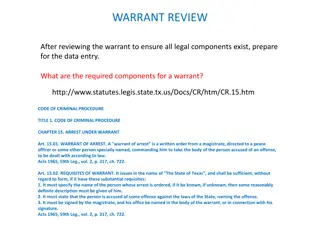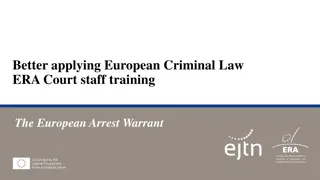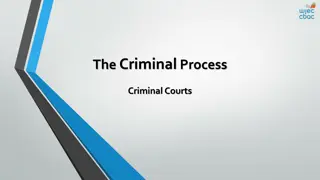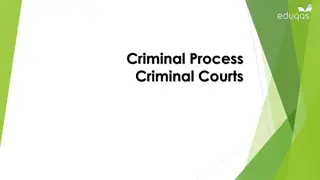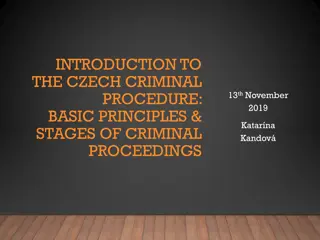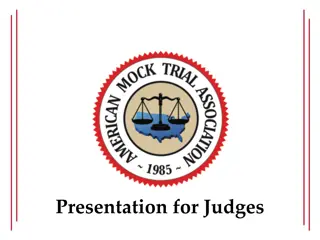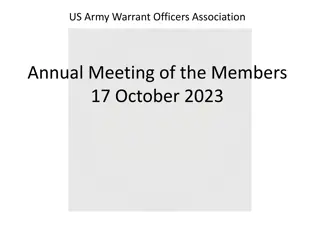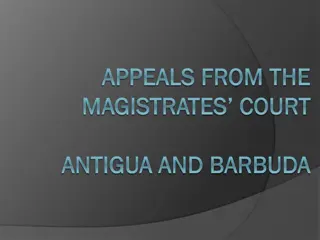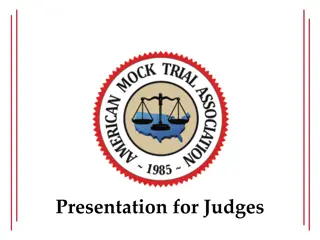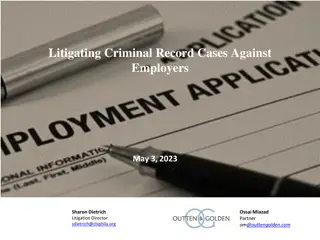Trial of Warrant Cases by Magistrates under the Code of Criminal Procedure 1973
The Code of Criminal Procedure 1973 Chapter 19 outlines the procedure for trial of warrant cases by magistrates where the prosecution presents evidence to support the case against the accused. Section 244 requires the magistrate to hear the prosecution and take all evidence presented. If the evidence is found insufficient, the accused may be discharged under Section 245. Section 246 details the procedure if the accused is not discharged, including framing charges and recording pleas. Court proceedings must adhere to the defined process as mandated by the law.
Download Presentation

Please find below an Image/Link to download the presentation.
The content on the website is provided AS IS for your information and personal use only. It may not be sold, licensed, or shared on other websites without obtaining consent from the author.If you encounter any issues during the download, it is possible that the publisher has removed the file from their server.
You are allowed to download the files provided on this website for personal or commercial use, subject to the condition that they are used lawfully. All files are the property of their respective owners.
The content on the website is provided AS IS for your information and personal use only. It may not be sold, licensed, or shared on other websites without obtaining consent from the author.
E N D
Presentation Transcript
THE CODE OF CRIMINAL PROCEDURE 1973 Chapter 19 Trial of warrant cases by magistrates B Cases instituted otherwise than on police report
Section 244 Evidence for Prosecution (1)When, in any warrant- case instituted otherwise than on a police report, the accused appears or is brought before a Magistrate, the Magistrate shall proceed to hear the prosecution and take all such evidence as may be produced in support of the prosecution. (2) The Magistrate may, on the application of the prosecution, issue a summons to any of its witnesses directing him to attend or to produce any document or other thing.
244 The section defines that the court shall give a hearing to the prosecution regarding the nature and character of the evidence that it wants to produce in support of the prosecution case. V.C.Shukla vs Delhi Administration AIR 1980 SC 962 The Apex Court held that trial proceedings under section 244 cannot be started until all the witnesses in support of prosecution are not examined and their evidence is recorded.
Section 245 When accused shall be discharged (1) If, upon taking all the evidence referred to in section 244, the Magistrate considers, for reasons to be recorded, that no case against the accused has been made out which, if unrebutted, would warrant his conviction, the Magistrate shall discharge him. (2) Nothing in this section shall be deemed to prevent a Magistrate accused at any previous stage of the case if, for reasons to be recorded by such Magistrate, he considers the charge to be groundless. from discharging the
245 If the evidence produced is not sufficient for making out a prima facie case against the accused, the magistrate is duty bound to discharge him under this section.
Section 246 Procedure where accused is not discharged. (1) If, when such evidence has been taken, or at any previous stage of the case, the Magistrate is of opinion that there is ground for presuming that the accused has committed an offence triable under this Chapter, which such Magistrate is competent to try and which, in his opinion, could be adequately punished by him, he shall frame in writing a charge against the accused. (2) The charge shall then be read and explained to the accused, and he shall be asked whether he pleads guilty or has any defence to make. (3) If the accused pleads guilty, the Magistrate shall record the plea, and may, in his discretion, convict him thereon. (4) If the accused refuses to plead, or does not plead or claims to be tried or if the accused is not convicted under sub- section (3), he shall be required to state, at the commencement of the next hearing of the case, or, if the Magistrate for reasons to be recorded in writing so thinks fit, forthwith, whether he wishes to cross- examine any, and, if so, which, of the witnesses for the prosecution whose evidence has been taken. (5) If he says he does so wish, the witnesses named by him shall be recalled and, after cross- examination and re- examination (if any), they shall be discharged. (6) The evidence of any remaining witnesses for the prosecution shall next be taken, and after cross- examination and re- examination (if any), they shall also be discharged.
246 This section empowers the magistrate to frame charge after the evidence for the prosecution under sec 244 is over or even at any previous stage, if he forms an opinion that a prima facie case is made out against the accused. The accused has the right of recalling and cross examining the prosecution after the charge is framed. witnesses for the
Section 247 Evidence for defence. The accused shall then be called upon to enter upon his defence and produce his evidence; and the provisions of section 243 shall apply to the case.
247 Rasik Bihari vs State of UP 1973 Cri.L.J. 1648 (All) Allahabad High Court held that it is the right of the accused to be called upon to enter his defence and produce his evidence and an omission to ask him to do so will be a serious irregularity in trial. The Magistrate should give reasonable opportunity to the accused to produce his evidence.
Section 248 Acquittal or conviction (1) If, in any case under this Chapter in which a charge has been framed, the Magistrate finds the accused not guilty, he shall record an order of acquittal. (2) Where, in any case under this Chapter, the Magistrate finds the accused guilty, but does not proceed in accordance with the provisions of section 325 or section 360, he shall, after hearing the accused on the question of sentence, pass sentence upon him according to law. (3) Where, in any case under this Chapter, a previous conviction is charged under the provisions of sub- section (7) of section 211 and the accused does not admit that he has been previously convicted as alleged in the charge, the Magistrate may, after he has convicted the said accused, take evidence in respect of the alleged previous conviction, and shall record a finding thereon: Provided that no such charge shall be read out by the Magistrate nor shall the accused be asked to plead thereto nor shall the previous conviction be referred to by the prosecution or in any evidence adduced by it, unless and until the accused has been convicted under sub- section (2)
Section 249 Absence of complainant When the proceedings have been instituted upon complaint, and on any day fixed for the hearing of the case, the complainant is absent, and the offence may be lawfully compounded or is not a cognizable offence, the Magistrate may, in his discretion, anything hereinbefore contained, at any time before the charge has been framed, discharge the accused. notwithstanding
Section 250 Compensation for accusation without reasonable cause (1) If, in any case instituted upon complaint or upon information given to a police officer or to a Magistrate, one or more persons is or are accused before a Magistrate of any offence triable by a Magistrate, and the Magistrate by whom the case is heard discharges or acquits all or any of the accused, and is of opinion that there was no reasonable ground for making the accusation against them or any of them, the Magistrate may, by his order of discharge or acquittal, if the person upon whose complaint or information the accusation was made is present, call upon him forthwith to show cause why he should not pay compensation to such accused or to each or any of such accused when there are more than one; or, if such person is not present, direct the issue of a summons to him to appear and show cause as aforesaid. (2) The Magistrate shall record and consider any cause which such complainant or informant may show, and if he is satisfied that there was no reasonable ground for making the accusation, may, for reasons to be recorded make an order that compensation to such amount, not exceeding the amount of fine he is empowered to impose, as he may determine, be paid by such complainant or informant to the accused or to each or any of them. (3) The Magistrate may, by the order directing payment of the compensation under sub- section (2), further order that, in default of payment, the person ordered to pay such compensation shall undergo simple imprisonment for a period not exceeding thirty days. (4) When any person is imprisoned under sub- section (3), the provisions of sections 68 and 69 of the Indian Penal Code (45 of 1860 ). shall, so far as may be, apply. (5) No person who has been directed to pay compensation under this section shall, by reason of such order, be exempted from any civil or criminal liability in respect of the complaint made or information given by him: Provided that any amount paid to an accused person under this section shall be taken into account in awarding compensation to such person in any subsequent civil suit relating to the same matter. (6) A complainant or informant who has been ordered under sub- section (2) by a Magistrate of the second class to pay compensation exceeding one hundred rupees, may appeal from the order, as if such complainant or informant had been convicted on a trial held by such Magistrate. (7) When an order for payment of compensation to an accused person is made in a case which is subject to appeal under sub- section (6), the compensation shall not be paid to him before the period allowed for the presentation of the appeal has elapsed, or, if an appeal is presented, before the appeal has been decided; and where such order is made in a case which is not so subject to appeal the compensation shall not be paid before the expiration of one month from the date of the order. (8) The provisions of this section apply to summons- cases as well as to warrant- cases
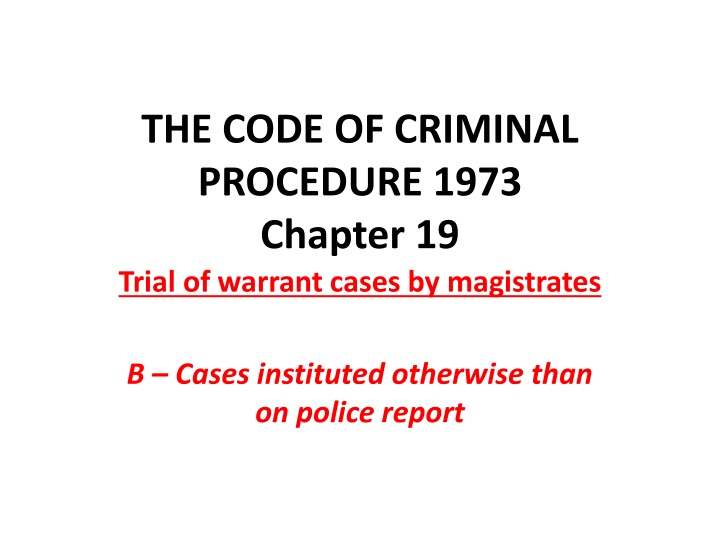


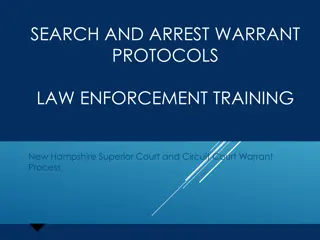
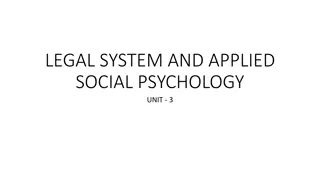
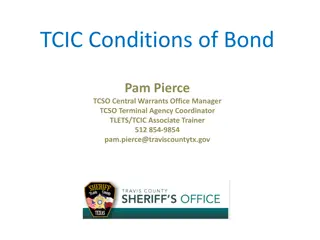
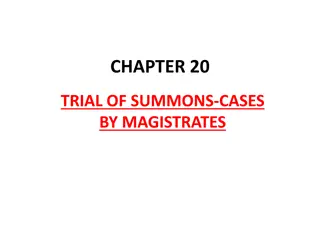
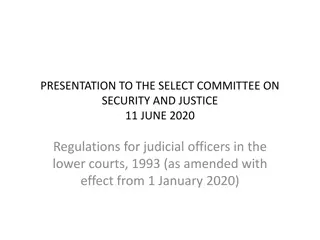
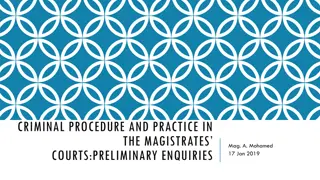
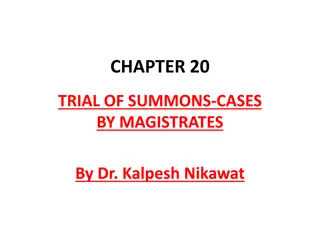
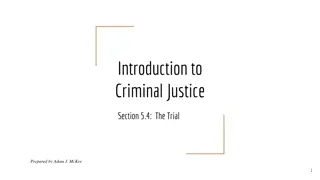
![Briefing on the Criminal Procedure Amendment Bill [B12-2021] to the Portfolio Committee on Justice and Correctional Services](/thumb/157093/briefing-on-the-criminal-procedure-amendment-bill-b12-2021-to-the-portfolio-committee-on-justice-and-correctional-services.jpg)
